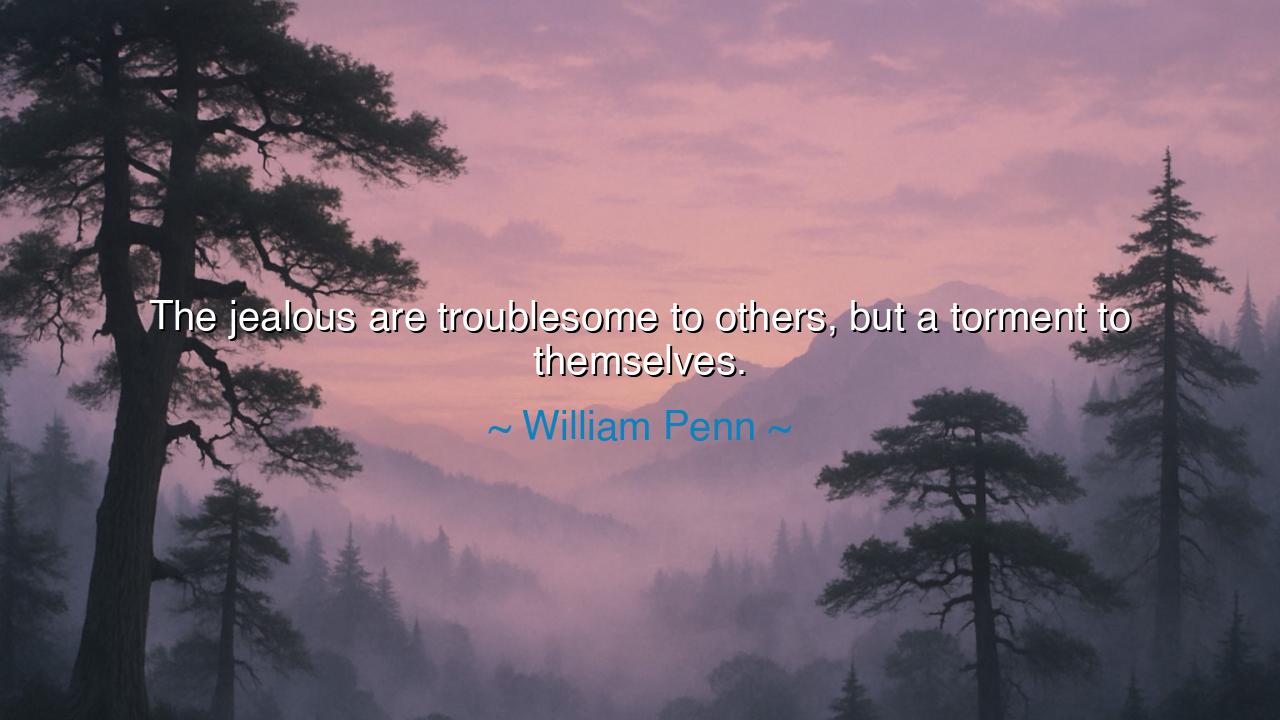
The jealous are troublesome to others, but a torment to






There are truths about the human heart so piercing that they echo across the ages, and among them stands the wisdom of William Penn, who observed: “The jealous are troublesome to others, but a torment to themselves.” In this simple yet profound statement lies an understanding of the dual nature of jealousy: it not only disrupts the peace of those around us, but it gnaws relentlessly at the soul of the one who harbors it. Penn, a Quaker of the seventeenth century and a seeker of moral clarity, recognized that jealousy is not merely a fleeting annoyance—it is a corrosive force that spreads through thought, word, and deed, leaving bitterness and unrest in its wake.
To comprehend the depth of Penn’s insight, one must first grasp the nature of jealousy. It arises when one measures oneself against another, fearing loss, inferiority, or exclusion. This emotion creates a web of suspicion, resentment, and quiet malice. The jealous person scrutinizes every action, interprets every success as a threat, and becomes restless in the face of another’s triumph. And while these behaviors unsettle those around them, the greater suffering is internal. The mind of the jealous cannot rest; it is perpetually in conflict, tormented by imagined slights and unfulfilled desires. As Penn warns, jealousy is a self-inflicted prison, invisible to the world but oppressive to the spirit.
The origin of this reflection lies in Penn’s life as a philosopher, theologian, and statesman. He founded Pennsylvania as a haven of tolerance and peace, guided by the principles of moral integrity and human dignity. In his writings and governance, he observed the fractures caused by envy and jealousy—within families, communities, and nations. Penn understood that unchecked jealousy breeds both social discord and personal anguish. It is a fire that consumes the heart of the one who tends it while threatening to ignite strife in all relationships it touches. His words serve as a timeless admonition to cultivate self-awareness and restraint.
History is rich with examples that illuminate this truth. Consider King Saul of Israel, whose envy of David’s rising favor consumed him. Saul’s jealousy made him a tyrant in his court, suspicious of friends and allies, plotting against a youth he once admired. Yet the greater torment was his own—fear, sleepless nights, and the gnawing knowledge that another surpassed him in skill and favor. Saul’s mind was never at peace; he could neither enjoy his own power nor bear the success of another. Penn’s observation is vividly reflected in Saul’s life: jealousy is outwardly destructive, but its greatest devastation is internal.
Even in less grand settings, jealousy exerts its silent tyranny. Families are torn by siblings who measure themselves against one another, colleagues quarrel over recognition, and friendships fracture when one envies the achievements or happiness of another. In each instance, Penn’s wisdom holds true: the jealous person creates hardship for others, yet the deeper, more insidious suffering lies within—the constant anxiety, the sleepless nights, the heart weighed down by bitterness. Envy is a tormentor that lives inside, invisible yet unrelenting.
The moral lesson of this truth is both subtle and profound: the cure for jealousy is self-reflection and contentment. To guard the mind against this torment, one must focus on one’s own growth rather than the achievements of others. Admiration and inspiration replace resentment when we learn to rejoice in the successes of those around us. By cultivating gratitude, humility, and purpose, we free ourselves from the invisible chains that jealousy constructs. The wise understand that peace of mind is a greater treasure than the fleeting satisfaction of comparison.
Practical guidance emerges naturally from Penn’s insight. Surround yourself with those who uplift, celebrate accomplishments without envy, and cultivate a mind that measures progress by personal growth, not by the fortunes of others. Observe jealousy within yourself and name it for what it is—a mental torment that serves no purpose other than to diminish your joy. Transform that energy into curiosity, learning, and gratitude. In doing so, you not only liberate yourself from suffering but prevent the harm of jealousy from spreading to others.
And so, let William Penn’s wisdom echo through the corridors of time: “The jealous are troublesome to others, but a torment to themselves.” Guard your heart, cultivate virtue, and banish envy from your mind. Let admiration replace resentment, and let your spirit rise above comparison. For the soul free of jealousy lives in peace, even amid the successes of others, while the mind ensnared by envy perishes quietly, trapped in its own relentless torment.






AAdministratorAdministrator
Welcome, honored guests. Please leave a comment, we will respond soon